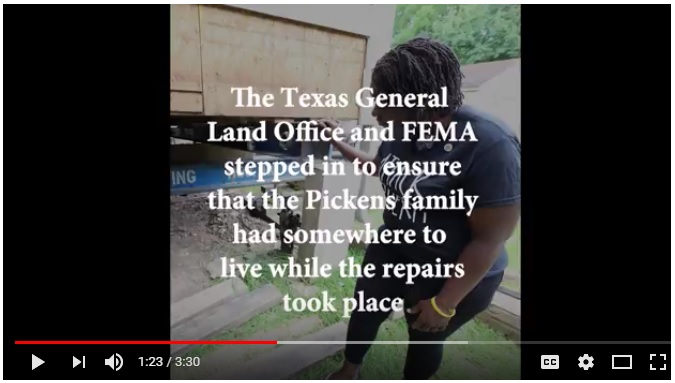Partners in Recovery: Personal touch brings Houston-area family to recovery finish line
The story of Rosenberg resident, Rose Pickens
Today the Federal Emergency Management Agency (FEMA) released the survivor story of Rose Pickens from Rosenberg, Texas. Rose's story is also told in the following video created by the Texas General Land Office, which was the first state agency in Texas history to partner with FEMA on the short-term disaster housing assistance mission:

Rose Pickens knew more about floods and federal disaster assistance than most people when Hurricane Harvey hit. She had received aid from FEMA after her house was damaged in the Memorial Day 2016 flood, and through her role as director of a local nonprofit, she had assisted many impoverished families whose homes had flooded.
Nonetheless, her family's road to recovery after Harvey presented a slow, daunting journey.
"A lot of people think it's a sprint, that it should be done quickly, but it's actually turning out to be a marathon," she said. "I was starting to lose hope."
A personal touch can make all the difference for someone in Pickens' shoes, and that touch was provided by Christa López of the Texas General Land Office.
"It seemed like everything that we thought was going to happen [was] falling through, and I was becoming a little desperate," Pickens told López in June. "You were able to come through for us. This blessing was amazing - more than I could ever think or imagine."
López had worked closely with Pickens for more than two months to find a housing solution while Rose, her husband and their three children prepared to elevate their home. The work, which was scheduled to begin in June, was expected to take three to six months.
The elevation work, though, couldn't begin until they found a temporary place to live. That place arrived in late March, thanks to López' tireless efforts.
"I was sitting here and began to see the [RV] come up the street," Pickens recalled. "Once I realized it was for us, the tears began to fall, and I just started praising God because there was hope.
"I immediately called [López] and said, 'Thank you so much for everything you've done for me and my family,'" Pickens said. "But I know this wasn't special: You do this for everyone that comes across your desk."
The RV was the family's second temporary home since Harvey, which flooded their house with 3 feet of water in August 2017. From September through November, they lived in a hotel while their home was returned to habitable conditions, including replacing all the floors.
Once the elevation is complete, the Pickens will move back, knowing they've done all they can to protect themselves from future flooding.
"This beam tells me my house is not going to flood again," Pickens said, pointing to a piece of equipment being used to elevate her home, "and if it does, the entire city of Rosenberg is underwater."
The Pickens' home was already 4 feet off the ground in the backyard and 2 in the front. To elevate it above the base flood elevation - the level where the odds of flooding are estimated to be 1 in 100 in any given year - they would only need to elevate it another 2.5 feet, but instead they are elevating it an additional 8 feet. That will give them enough room to utilize the space underneath, and give them peace of mind in a location that has already defied the odds when it comes to flooding.
"You never think that something like [the Memorial Day flood] can happen, and then it happens, and you're like 'Surely, it's not going to happen again,'" Pickens said. "The news kept on taunting that [2016] was a 100-year flood, and it's like, 'Wow, 15 months [and it's happening again].' That's pretty horrific."
Pickens and her nonprofit, Friends of North Rosenberg, which is part of the global group Attack Poverty, have been restoring flood-damaged homes since Memorial Day 2016. Not only does Friends of North Rosenberg have local volunteers, but Pickens has organized another 2,400 individuals from 30 states, who have traveled to Rosenberg to pitch in since Harvey.
In addition to "mucking and gutting" and repairing flooded homes, the organization is in the process of elevating six houses, while another 15 elevations are being planned. Volunteers also provide stress management counseling, preparedness workshops and many other resources for the impoverished members of Rosenberg.
"A lot of families ... lost everything for a second time [during Harvey]," Pickens said. "As the community began to recover, a sense of resilience was formed there. ... Being in poverty, you kind of learn how to navigate and deal with certain things that happen in life, and unfortunately this is one of those times."
For additional information on Hurricane Harvey and Texas recovery, visit the Hurricane Harvey disaster web page at www.fema.gov/disaster/4332, Facebook at www.facebook.com/FEMAharvey, the FEMA Region 6 Twitter account at www.twitter.com/FEMARegion6 or the Texas Division of Emergency Management website at https://www.dps.texas.gov/dem/.
###
Helping people before, during, and after disasters.
Disaster recovery assistance is available without regard to race, color, religion, nationality, sex, age, disability, English proficiency or economic status. If you or someone you know has been discriminated against, call FEMA toll-free at 800-621-3362 (voice, 711/VRS - Video Relay Service) (TTY: 800-462-7585). Multilingual operators are available (press 2 for Spanish).
More Press Releases

